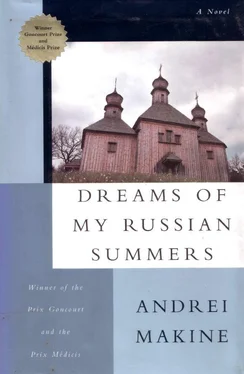"We are going to the station!" she cried, further astonishing the taxi driver still more with the vibrant and very foreign resonance of her voice.
"To the station," repeated the little girl, who had just now hailed him in the street. She, on the other hand, spoke very good Russian, with a slight Siberian accent…
Charlotte knew that Albertine's emergence at the top of the steps had been preceded by a long and painful battle, interrupted by several relapses – like the struggle of that man, battling in a black hole in the midst of the ice, which Charlotte had seen one day in spring, as she crossed the bridge. He clung to a long branch that was being pushed toward him and crawled up the slippery slope of the riverbank, sprawled flat on his stomach on the icy surface, progressing centimeter by centimeter, already stretching out his red hand, as he touched those of his rescuers. Suddenly, incomprehensively, his body shuddered, started to slip, and fell back once more into the black water. The current dragged him a little farther. Everything had to begin again… Yes, like that man.
But on that luminous and verdant summer's afternoon their actions were lightness itself. "What about the big suitcase?" cried Charlotte, when they were installed on the seats.
"We'll leave it. It only has old papers in it, and all those newspapers of your uncle's… We'll come back one day to collect it."
They crossed the bridge, passing beside the governor's house. The Siberian town seemed to unfold like a strange past, where it was possible to forgive with a smile…
Once they were settled in Paris again, it was with just such a lack of bitterness that they would look back on Boyarsk. And when that summer Albertine resolved to return to Russia (in order, as her family understood, to put a definitive end to the Siberian period of her life), Charlotte even showed a little jealousy toward her mother: she too would have liked to spend a couple of weeks in that town, now perceived as being inhabited by people from their past, where the houses, their izba among them, were turning into monuments to days gone by. A town where nothing could hurt her anymore.
"Maman, don't forget to look and see if there is still a nest of mice there. Beside the stove, remember?" she called to her mother as she stood at the lowered window of the railway carriage.
It was July 1914. Charlotte was eleven.
Her own life did not experience any interruption. It was simply that, as time went by, her last words ("Don't forget the mice!") seemed to her more and more stupid and childish. She ought to have kept silent and scrutinized the face at the carriage window, feasted her eyes on its features. Months, years, passed, and that last remark still carried the same resonance of a foolish happiness. Now the only time in Charlotte's life was waiting time.
That time ("in wartime," the newspapers wrote) was like a gray afternoon, a Sunday in the deserted streets of a provincial town: suddenly a gust of wind appears at the corner of a house, raising a whirlwind of dust; a shutter swings silently; a man melts easily into this colorless air, disappears without reason.
Thus it was that Charlotte's uncle disappeared – "fallen on the field of honor," "dead for France," according to the newspaper's formula. And this form of words made his absence all the more disconcerting – like the pencil sharpener on his desk, with a pencil inserted in the hole and several fine parings undisturbed since his departure. Thus it was that the house at Neuilly gradually emptied – women and men would bend down to kiss Charlotte and, with a very serious air, tell her to be a good girl.
That strange time had its capricious moments. All of a sudden, with the jerky rapidity of films, one of her aunts dressed herself in white and summoned her relatives, who gathered about her with all the speed of the cinema of that period. Then they headed off at a spanking pace to the church, where the aunt appeared beside a man with a mustache and sleek, oily hair. And almost at once – as Charlotte remembered it, they did not even have time to leave the church – the young bride was robed in black and unable to raise her eyes, which were weighed down with tears. The change was so rapid it seemed as if she had already been alone as she left the church, and dressed in full mourning, hiding her reddened eyes from the sun. The two days merged into one, colored by a radiant sky and enlivened by the church bells and the summer breeze, which seemed to accelerate the coming and going of the guests even more. And what the warm breeze pressed against the face of the young woman was a white bridal veil one moment and a widow's black veil the next.
Later this eerie time resumed its regular pace and was punctuated with sleepless nights and a long procession of mutilated bodies. The passing hours now echoed with the resonance of the big classrooms in the school at Neuilly, converted into a hospital. Her first knowledge of a man's body was the sight of male flesh, torn and bloody… And the nocturnal sky of those years would be forever overhung. with the pallid monstrosity of two German zeppelins among the luminous stalagmites of the searchlights.
Finally there came a day, on July 14, 1919, when countless columns of soldiers came marching through Neuilly, heading for the capital. Spick and span, with brave looks and well-polished army boots: war was resuming the guise of a parade. Was he among them, that warrior who was to slip a little brown pebble into Charlotte's hand, that shell splinter covered in rust? Were they lovers? Engaged? This encounter did not alter Charlotte's decision, made several years earlier. At the first opportunity that came along, a miraculous opportunity, she left for Russia. There was still no communication with that country ravaged by civil war. It was 1921. A Red Cross mission was preparing to travel to the Volga region, where famine had claimed hundreds of thousands of victims. Charlotte was taken on as a nurse. Her application had been quickly accepted: volunteers for the expedition were rare. But above all, she spoke Russian.
Once over there she believed that she had come to know hell. In the distance it looked like peaceful Russian villages – izbas , wells, hedges – swathed in the mists of the great river. Close to, it froze into shots taken by the mission photographer in those somber days: a group of male and female peasants in lambskin greatcoats, transfixed before a heap of human carcasses, dismembered bodies, unrecognizable fragments of flesh. Then this naked child in the snow with long, tangled hair, an old man's piercing stare, and the body of an insect. Finally, on an icy road – that head, alone, with open eyes, glassy Worst of all, these pictures did not remain fixed. The photographer folded up his tripod, and the peasants left, stopping outside the frame of the photo – that terrifying photo of the cannibals – and resumed the daily round of their lives with all its disconcerting simplicity. Yes, they continued living! A woman bent over the child and recognized him as her son. And she did not know what to do with this old-man-insect, she who for weeks had fed on human flesh. Then what could be heard arising from her throat was the howl of a wolf. No photo could capture that cry… A peasant looked into the eyes of the head thrown down onto the road and sighed. Then he leaned over and with a clumsy hand thrust it into a great homespun sack. "I'll bury it," he muttered. "After all, we're not Tartars…"
And you had to go into the izbas of this tranquil hell to discover that the old woman watching the street through the window was the mummified corpse of a girl who had died several weeks previously, seated at that window in the vain hope of rescue.
Once back in Moscow Charlotte left the mission. Walking out of the hotel, she plunged into the motley throng on the square and disappeared. At Sukharevka market, where barter was king, she exchanged a silver five-franc piece (the trader marked the coin with his molar, then made it ring on the blade of an ax) for two loaves of bread, which would provide for the first days of her journey. She was already dressed like a Russian, and at the station, in the violent and disorderly assault on the carriages, nobody paid any attention to this young woman hitching up her knapsack and fighting her way into the frenetic heavings of the human chaos.
Читать дальше












